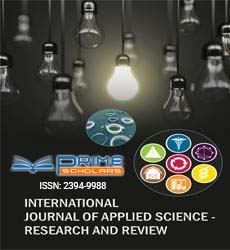Commentary - (2024) Volume 11, Issue 5
Impact of Atlantic Ocean Circulation Slowdown on Intensified Tropical Cyclones in the North Atlantic
Oliver Richardson*
Department of Applied Science, Universidad Austral de Chile, Chile
*Correspondence:
Oliver Richardson,
Department of Applied Science, Universidad Austral de Chile,
Chile,
Email:
Received: 01-Oct-2024, Manuscript No. IPIAS-24-21945;
Editor assigned: 03-Oct-2024, Pre QC No. IPIAS-24-21945 (PQ);
Reviewed: 17-Oct-2024, QC No. IPIAS-24-21945;
Revised: 22-Oct-2024, Manuscript No. IPIAS-24-21945 (R);
Published:
29-Oct-2024, DOI: 10.36648/2394-9988-11.5.44
Description
The Atlantic Meridional Overturning Circulation (AMOC), a key
component of the global climate system, has been undergoing a
gradual slowdown over the past several decades. This circulation,
which drives the large-scale movement of warm and cold
water in the Atlantic Ocean, plays a crucial role in regulating
global temperatures and influencing weather patterns. As the
AMOC weakens, its effects are increasingly being felt in various
regions, with one of the most concerning consequences being
the intensification of tropical cyclones in the North Atlantic.
These storms, which already pose a significant threat to coastal
populations, are becoming more powerful and destructive, linked
in part to changes in the oceanic and atmospheric conditions driven
by the slowdown of the AMOC. The AMOC helps to transport
warm water from the tropics to the North Atlantic, where it cools
and sinks, creating a deep oceanic conveyor belt that regulates
heat distribution across the globe. When the AMOC slows, this
process is disrupted. The reduced flow of warm water in the upper
layers of the ocean causes the surface waters to heat up more than
usual. This elevated Sea Surface Temperature (SST) provides the
energy necessary for tropical cyclones to intensify, as these storms
rely on warm ocean water to fuel their growth and strength. Rising
SSTs are already one of the primary contributors to the increase
in the frequency and intensity of tropical cyclones in the North
Atlantic. As these temperatures rise, the atmospheric conditions
that foster the development of storms become more conducive.
Warmer sea surface temperatures lead to greater evaporation,
which in turn provides more moisture to the atmosphere. This
moisture, combined with the atmospheric instability fostered by
warm ocean temperatures, creates a more conducive environment
for the rapid development of cyclones. These conditions not only
make it easier for storms to form but also allow them to grow
stronger more quickly once they develop. The weakening of the
AMOC also leads to a shift in the atmospheric pressure systems
over the North Atlantic. The warming of the ocean surface alters
the patterns of wind and pressure, potentially causing storms
to form further south or move more slowly across the ocean.
These changes allow storms to gain more strength before making
landfall, prolonging their intensity and increasing the damage they
can cause. Additionally, slower-moving storms are more likely to
dump larger quantities of rainfall over affected regions, leading
to devastating floods in coastal and inland areas. The evidence
linking the slowdown of the AMOC to the intensification of
tropical cyclones is still a subject of active research, but scientists
are increasingly confident in the relationship. Studies suggest
that as the AMOC weakens, the overall atmospheric and oceanic
conditions in the North Atlantic are becoming more favorable for
the development of stronger storms.
The intensification of tropical cyclones due to the AMOC slowdown
represents a dangerous feedback loop. As the storms become
more powerful, they cause more damage to infrastructure,
economies, and ecosystems, which in turn contributes to the
emission of greenhouse gases through the destruction of homes
and industries. The impact on global temperatures from more
frequent and severe storms can further accelerate climate change,
which may, in turn, contribute to the continued weakening of the
AMOC. In conclusion, the slowdown of the Atlantic Meridional
Overturning Circulation is having a profound effect on the climate
system, with one of its most alarming consequences being the
intensification of tropical cyclones in the North Atlantic.
Acknowledgement
None.
Conflict Of Interest
The author declares there is no conflict of interest in publishing
this article.
Citation: Richardson O (2024) Impact of Atlantic Ocean Circulation Slowdown on Intensified Tropical Cyclones in the North Atlantic. Int J Appl Sci Res Rev. 11:44.
Copyright: © 2024 Richardson O. This is an open-access article distributed under the terms of the Creative Commons Attribution License, which permits unrestricted use, distribution, and reproduction in any medium, provided the original author and source are credited.

